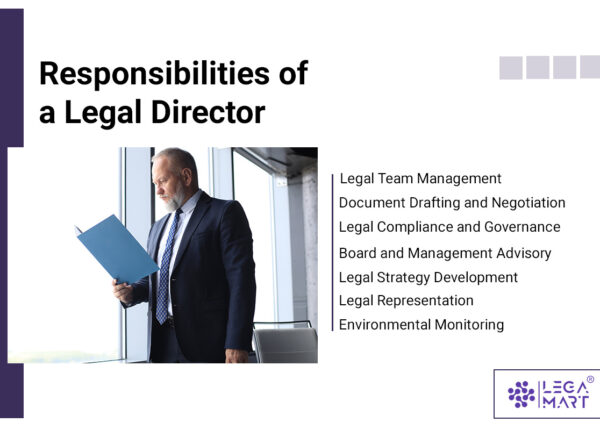Introduction
The role of a Legal Director has become crucial in today’s big and medium-sized company legal teams. Because legal technology has advanced quickly over the last five years, Legal Directors are at the forefront, suggesting and putting in place new ideas that make legal departments work better and be more productive. If you’re interested in using your legal skills and leadership abilities to lead a group of legal experts and make legal services work well, then the job of a legal director might be for you. This high-up executive role manages the legal side of an organization, whether it’s a company, government group, or non-profit, needing a mix of legal know-how, business sense, and strategic thinking.
A legal director is in charge of leading the legal team, driving the creation and execution of legal plans, making sure the company follows laws and rules, and giving necessary legal advice to the leaders and executive team. In this article, we’ll look into how you can become a legal director, break down the detailed roles and responsibilities that come with the job, and explain the necessary skills and qualifications to do well in this impactful position.
What Is a Legal Director?
In general terms, a director is an individual appointed or elected by shareholders to serve on a board of directors, possessing the authority to implement corporate policies and make decisions through voting on board resolutions. Equally, a legal director holds the leadership position within a firm or company’s legal team.
In a law firm setting, the role of a legal director ranks second only to full partners. Legal directors are often tasked with critical responsibilities related to the firm’s business operations, managing legal cases, and overseeing or leading other team members.
In a corporate setting, a Legal Director’s management responsibilities encompass strategic leadership, close collaboration with legal staff, board members, and company executives. Job duties may involve providing legal counsel to company management, supervising departmental employees, and overseeing legal affairs. Legal directors may also liaise with external lawyers and regulatory agencies in regulated industries.
How to Become a Legal Director?
Becoming a Legal Director requires a combination of specialized legal knowledge, business understanding, and leadership skills. Furthermore, seeking guidance from someone experienced in this role can also provide valuable insights and advice. Here’s a guide on how to become a legal director:
Get the Right Education:
Start by earning a relevant bachelor’s degree, such as law, political science, or business, followed by a postgraduate law degree and passing required exams to meet the educational criteria.
Earn Practice Certificates:
After completing your training contract, apply for a Practicing Certificate (PC) for solicitors or a Bar Professional Training Course (BPTC) for barristers. These certificates certify your qualifications to practice law.
Gain Practical Experience:
Secure a training contract with a law firm or in-house legal team.
Take Leadership Roles:
Look for opportunities to manage parts of a legal team, practice group, or business portfolio. Develop skills in supervision, business development, and legal guidance.
Gain Advanced Leadership Experience:
Use your extensive legal experience and proven management skills to apply for a legal director position when available. This could be in a law firm, company, or Chambers.
Responsibilities of a Legal Director

As a legal director, your multifaceted roles and responsibilities are tied to the organizational context, encompassing aspects such as size, nature, and structure. Besides, a legal director assumes a pivotal role in safeguarding a firm or company’s adherence to legal standards and mitigating legal risks. Here’s a detailed breakdown of what the role typically entails:
Legal Team Management:
Leading and supervising the legal team, including lawyers, paralegals, legal assistants, and other staff members, a legal director establishes departmental goals, assigns and monitors workloads, evaluates performance, and offers feedback and coaching.
Additionally, a legal director is involved in the recruitment, training, and development of legal talent, ensuring they have the necessary resources and support for their duties.
Document Drafting and Negotiation:
Negotiate and draft a variety of legal documents, including contracts, agreements, and policies.
Ensure clarity, enforceability, and alignment with the organization’s best interests.
Oversee the entire lifecycle of contracts, from inception and negotiation to finalization.
Legal Compliance and Governance:
Ensuring organizational compliance with applicable laws and regulations in the jurisdictions of operation, the legal director keeps abreast of legal changes, updating the organization’s policies and procedures accordingly.
Internal governance and ethical standards are implemented and enforced by the legal director, who handles legal complaints, investigations, or audits.
Board and Management Advisory:
Advise the board and executive management on legal issues influencing decision-making.
Collaborate on strategic leadership, ensuring legal considerations are integral to business planning.
Propose solutions and recommendations on legal matters impacting organizational objectives.
Legal Strategy Development:
Designing and executing the legal strategy aligned with the organization’s vision, mission, and values, the legal director identifies and analyzes legal risks and opportunities affecting operations, projects, and initiatives. Offering advice to senior management and the board of directors on the legal implications of decisions, the legal director proposes solutions and recommendations. Additionally, the legal director oversees the drafting, reviewing, and negotiation of contracts, agreements, policies, and other legal documents.
Legal Representation:
In the event of legal disputes or litigation, the legal director represents the organization in legal matters, including disputes, litigation, and negotiations.
Collaborate with external counsel when necessary, ensuring alignment with organizational goals.
Manage and oversee the legal aspects of mergers, acquisitions, and other corporate transactions.
Environmental Monitoring:
Stay vigilant to legal trends that may impact the organization’s interests.
Proactively identify emerging legal issues, providing insights to preempt potential challenges.
Navigate the legal landscape to safeguard the organization’s legal standing and mitigate risks.
Requirements for Becoming a Legal Director

For those aspiring to secure the role of legal director, the following are key prerequisites:
Education qualifications
Attaining the position of legal director necessitates a strong educational background. Typically, candidates are required to hold a bachelor’s degree in law. However, individuals who have finished a bachelor’s degree in an unrelated field may opt for the Juris Doctor (JD) as an alternative to the Bachelor of Law (LLB). They are also required to possess a valid license to practice law in their respective jurisdiction.
- Law Degree or Equivalent: The initial step toward becoming a legal director involves completing a degree-level legal qualification. One pathway is pursuing a traditional law degree, typically a three-year full-time program. Alternatively, candidates can opt for a degree apprenticeship, which spans five to six years and requires employer support. This apprenticeship offers the advantage of earning while learning.
- Qualified Lawyer Status: Attaining qualified lawyer status is a crucial requirement. This status is essential for progressing from an associate to a senior associate, often serving as a prerequisite for ascending to the role of legal director. Qualifying as a lawyer involves completing the Solicitors Qualifying Examination (SQE) or accumulating two years of post-Legal Practice Course (LPC) qualifying work experience (QWE) within a law firm.
2. Professional Experience
Given the seniority of the legal director position, substantial work experience is generally a prerequisite. Many companies seek candidates with ten or more years of professional experience.
Moreover, a candidate for the legal director role should possess several years of experience as a lawyer, ideally within a pertinent sector or industry. Depending on the specific organization, additional qualifications or certifications may be necessary.
Furthermore, candidates often need a considerable amount of work experience as an associate and senior associate. Achieving senior associate status might be a requirement for transitioning to the legal director role, a process that typically spans five to seven years.
3. Key Skills and Competencies for Legal Directors
Becoming a legal director requires more than legal knowledge; it demands the development of specialized skills and competencies. In addition to the foundational skills essential for an effective legal professional, legal directors also find value in:
- Decision-Making and Organizational Skills: Vital for handling increased responsibilities, these skills are often evaluated by partners when considering candidates for promotion to the legal director role.
- Strong Leadership and Management Skills: As a legal director, you’ll lead a team of lawyers and other legal professionals, making leadership and management prowess crucial.
- Excellent Communication and Negotiation Skills: Interacting with various stakeholders, including the board, management, clients, regulators, and media, requires effective communication and negotiation abilities.
- Strategic and Analytical Skills: Developing and implementing legal policies and plans aligned with organizational goals necessitates strategic thinking and analytical acumen.
- Ethical and Professional Standards: Upholding compliance and integrity across the organization is a key responsibility, requiring a commitment to ethical and professional standards.
How can you advance in the role as a legal director?
- Demonstrate Value and Impact: Prove your worth and influence within the organization and the legal function. Measure and communicate the positive outcomes and benefits of your initiatives and projects.
- Build Strong Relationships: Foster robust connections with internal and external partners and collaborators. You can also cultivate a network that supports your role and enhances collaboration.
- Stay Informed: Keep abreast of the latest trends and developments in the legal industry and legal operations. Stay informed about emerging practices and technologies relevant to your field.
- Continuous Learning: Invest in continuous learning to enhance your skills and competencies. Stay proactive in acquiring new knowledge that aligns with evolving industry demands.
- Embrace Challenges: Seek out new challenges and opportunities to expand your influence. It is important to embrace tasks that allow you to broaden your scope as a director of legal operations.
Conclusion
Pursuing a career as a Legal Director presents an opportunity to blend legal expertise with strategic leadership, offering a unique and impactful role within corporate legal departments. Whether you aspire to lead a team of legal professionals, optimize legal services, or contribute to the wider life of an organization, the role of a Legal Director demands a combination of legal acumen, business savvy, and visionary thinking. As the legal industry continues to transform, Legal Directors play a crucial role in shaping the direction of organizations, ensuring compliance, and navigating complex legal landscapes.
Frequently Asked Questions (FAQ)
What are the average salaries for Legal Directors in the United Kingdom and the United States?
In the United Kingdom, Legal Directors working in London have an average annual salary ranging from £100,000 to £130,000. The overall average annual salary for Legal Directors in the United Kingdom is £109,493, with additional cash compensation averaging £11,818. As of Feb 14, 2024, the average annual pay for a Legal Director in the United States is $139,444.
What makes a Legal Director role in a law firm appealing?
There are two primary reasons individuals might find a Legal Director role in a law firm attractive. Firstly, it offers significant responsibility without the same demands as a partnership. This position involves active participation in the broader aspects of the firm, extending beyond immediate team responsibilities. Some firms have introduced more Legal Director roles to meet the demand for alternative career paths to partnership.
Secondly, being a Legal Director in a law firm can serve as a stepping stone to a partnership. With greater responsibilities compared to a senior associate and increased visibility into the firm’s operations, this role provides an opportunity to develop the skills necessary for prospective partners.




